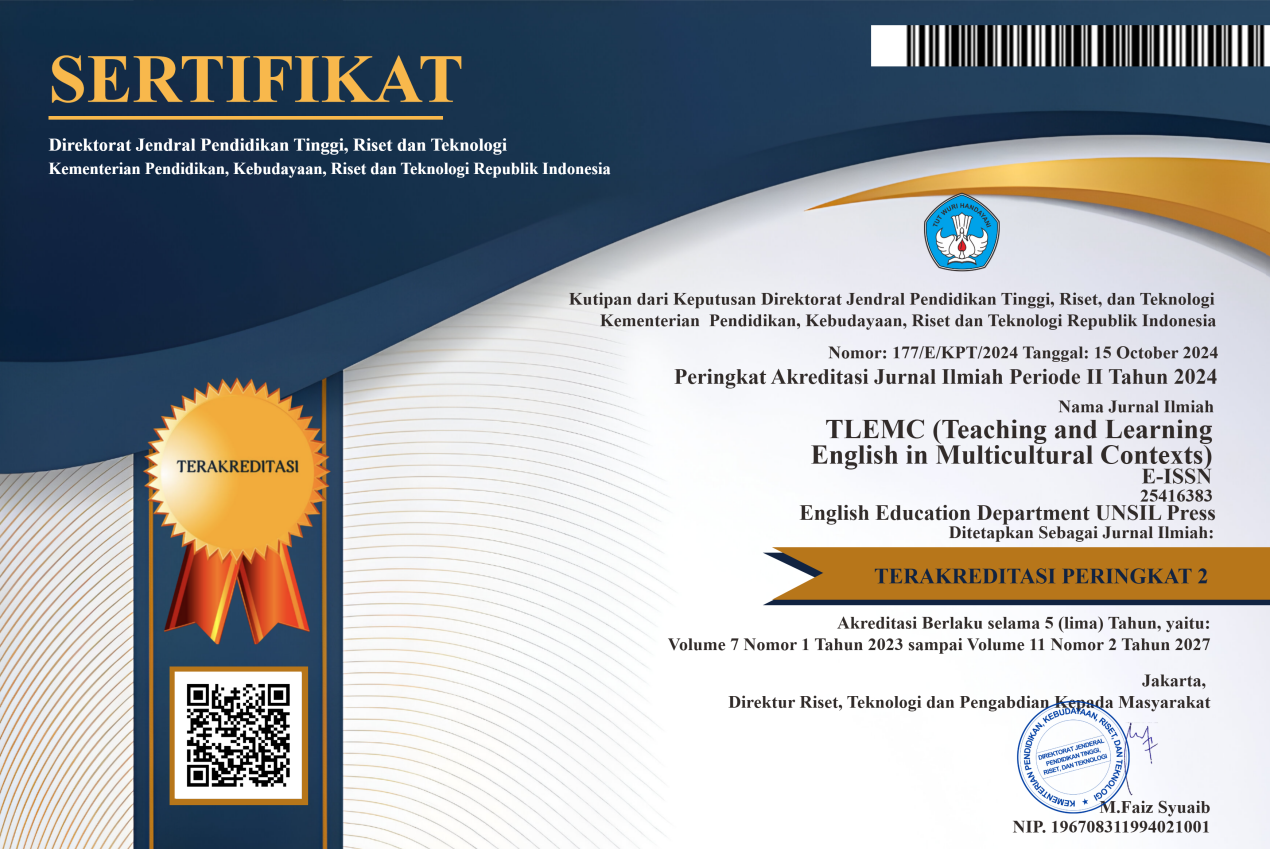Indonesian EFL Students’ Experience towards Distance Learning during Covid-19 Pandemic
Abstract
Covid-19 pandemic has shifted face-to-face learning to distance learning since 2020. It occurs around the world including Indonesia. Generally, distance learning is new for the students but they have no choice to learn during this pandemic situation. Thus, this qualitative study aims to explore college students’ experience towards distance learning during Covid-19 pandemic. The college students taking English course at a Hindu Religion School located in Jakarta, Indonesia were administered a close and open-ended questionnaire and interviewed. The data were analyzed thematically. Findings suggested that the technology platform mostly used in the learning     process was Zoom. In addition, most students did not find the obstacles to learning     and only a few students had problems getting a stable internet access during learning. They also had adequate financial resources to undertake distance     learning. They lacked time to study during the pandemic. Majority of them perceived that their language skills (speaking, reading, writing, listening, and vocabulary) were quite improved. They also reported that distance learning had positive and negative impacts. By comparing those impacts, they preferred distance learning to face-to-face learning in future. The recommendations for the instructors and policy makers are explicated to improve future learning better.
Full Text:
PDFReferences
Azhari, B., & Fajri, I. (2021). Distance learning during the COVID-19 pandemic : School closure in Indonesia. International Journal of Mathematical Education in Science and Technology, 1–22. https://doi.org/10.1080/0020739X.2021.1875072
Becker, D. A. (2020). Creating online teaching resources and suggesting mobile apps in the time of COVID 19. Journal of Electronic Resources in Medical Libraries, 17(3–4), 105–112. https://doi.org/10.1080/15424065.2020.1829233
Bokayev, B., Torebekova, Z., Davletbayeva, Z., & Zhakypova, F. (2020). Distance learning in Kazakhstan : Estimating parents’ satisfaction of educational quality during the coronavirus. Technology, Pedagogy and Education, 1–14. https://doi.org/10.1080/1475939X.2020.1865192
Carrillo, C., & Flores, M. A. (2020). COVID-19 and teacher education: a literature review of online teaching and learning practices. European Journal of Teacher Education, 43(4), 466–487. https://doi.org/10.1080/02619768.2020.1821184
Dong, C., Cao, S., & Li, H. (2020). Young children’s online learning during COVID-19 pandemic: Chinese parents’ beliefs and attitudes. Children and Youth Services Review, 118(August), 105440. https://doi.org/10.1016/j.childyouth.2020.105440
Ewing, L., & Cooper, H. B. (2021). Technology-enabled remote learning during COVID-19 : Perspectives of Australian teachers, students and parents. Technology, Pedagogy and Education, 1–18. https://doi.org/10.1080/1475939X.2020.1868562
Hussein, E., Daoud, S., Alrabaiah, H., & Badawi, R. (2020). Exploring undergraduate students’ attitudes towards emergency online learning during COVID-19: A case from the UAE. Children and Youth Services Review, 119, 105699. https://doi.org/10.1016/j.childyouth.2020.105699
Kast, J., Lindner, K., Gutschik, A., & Schwab, S. (2021). Austrian teachers’ attitudes and self-efficacy beliefs regarding at-risk students during home learning due to COVID-19. European Journal of Special Needs Education, 36(1), 114–126. https://doi.org/10.1080/08856257.2021.1872849
Kruszewska, A., Nazaruk, S., & Szewczyk, K. (2020). Polish teachers of early education in the face of distance learning during the COVID-19 pandemic–the difficulties experienced and suggestions for the future. Education 3-13, 1–12. https://doi.org/10.1080/03004279.2020.1849346
Lemay, D. J., Doleck, T., & Bazelais, P. (2021). Transition to online teaching during the COVID-19 pandemic. Interactive Learning Environments, 1–13. https://doi.org/10.1080/10494820.2021.1871633
Metscher, S. E., Tramantano, J. S., & Wong, K. M. (2020). Digital instructional practices to promote pedagogical content knowledge during COVID-19. Journal of Education for Teaching, 1–5. https://doi.org/10.1080/02607476.2020.1842135
Palau, R., Fuentes, M., Mogas, J., & Cebrián, G. (2021). Analysis of the implementation of teaching and learning processes at Catalan schools during the Covid-19 lockdown. Technology, Pedagogy and Education, 1–17. https://doi.org/10.1080/1475939X.2020.1863855
Saif Almuraqab, N. A. (2020). Shall universities at the UAE continue distance learning after the CoviD-19 pandemic? Revealing students’ perspective. International Journal of Advanced Research in Engineering and Technology, 11(5), 226–233. https://doi.org/10.34218/IJARET.11.5.2020.024
Sepulveda-Escobar, P., & Morrison, A. (2020). Online teaching placement during the COVID-19 pandemic in Chile: challenges and opportunities. European Journal of Teacher Education, 43(4), 587–607. https://doi.org/10.1080/02619768.2020.1820981
Styck, K. M., Malecki, C. K., Ogg, J., & Demaray, M. K. (2020). Measuring COVID-19-related stress among 4th through 12th grade students. School Psychology Review, 1–16. https://doi.org/10.1080/2372966X.2020.1857658
Xie, J., Gulinna, A., & Rice, M. F. (2021). Instructional designers’ roles in emergency remote teaching during COVID-19. Distance Education, 42(1), 70–87. https://doi.org/10.1080/01587919.2020.1869526
Yates, A., Starkey, L., Egerton, B., & Flueggen, F. (2020). High school students’ experience of online learning during Covid-19: the influence of technology and pedagogy. Technology, Pedagogy and Education, 00(00), 1–15. https://doi.org/10.1080/1475939X.2020.1854337
DOI: https://doi.org/10.37058/tlemc.v5i2.3571
Refbacks
- There are currently no refbacks.
INDEXED BY:
This work is licensed under a Creative Commons Attribution-NonCommercial-ShareAlike 4.0 International License.
![]()
TLEMC (Teaching and Learning English in Multicultural Contexts)
Program Studi Pendidikan Bahasa Inggris
Fakultas Keguruan dan Ilmu Pendidikan
Universitas Siliwangi
Jl. Siliwangi No. 24 Kota Tasikmalaya - 46115
email: tlemc@unsil.ac.id





